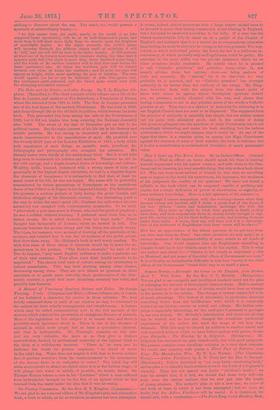On Fasting Communion. By the Rev. H. T. Kingdom (Longmans.)—
We are glad to see a second edition of Mr. Kingdon's able and exhaustive book, a book to which, as far as we know, no answer has been attempted.
It seems, indeed, almost monstrous that a large octavo should have to be devoted to prove that fasting communion is not binding in England, but a fool must be answered according to his folly. If a man has the almost inconceivable folly to stand up in a pulpit of the Church of England, and maintain that it is a mortal sin to communicate otherwise than fasting, he must be shown to be wrong on his own grounds. The way, indeed, in which individual priests lay down the law is a ludicrous in- consistency, of which probably only an Englishman could be guilty. He exercises in the most wilful way the private judgment which he on other occasions loudly condemns. He selects what he is pleased to call "Catholic practices," and preaches them,—that is, not merely advises them, but enjoins them—as being matters of faith and necessity. He " selects," let it be observed, for very probably he is married, and no " Catholic practice " has stronger authority in its favour than the celibacy of the clergy. Mr. King- don, however, deals with the subject from the stand -point of those with whom he agrees, whose theological opinions indeed are, we presume, mainly identical with his own, and shows that fasting communion is not in any genuine sense of the words a Catholic practice at all. That there is a shadow of authority for enforcing it in our English Church does not need to be disproved.- The argument from the practice of antiquity is naturally less simple, but our author makes out his point with abundant proof, and in the course of doing this gives us glimpses into the practices of early Christianity which are exceedingly interesting, and make his book anything but the tedious performance which we might suppose that it would be. As one of the signs that there is a reaction going on among the High Churchmen against the excesses of some of their number, the book is welcome, but it is also a contribution to ecclesiastical literature of much permanent value.


































 Previous page
Previous page